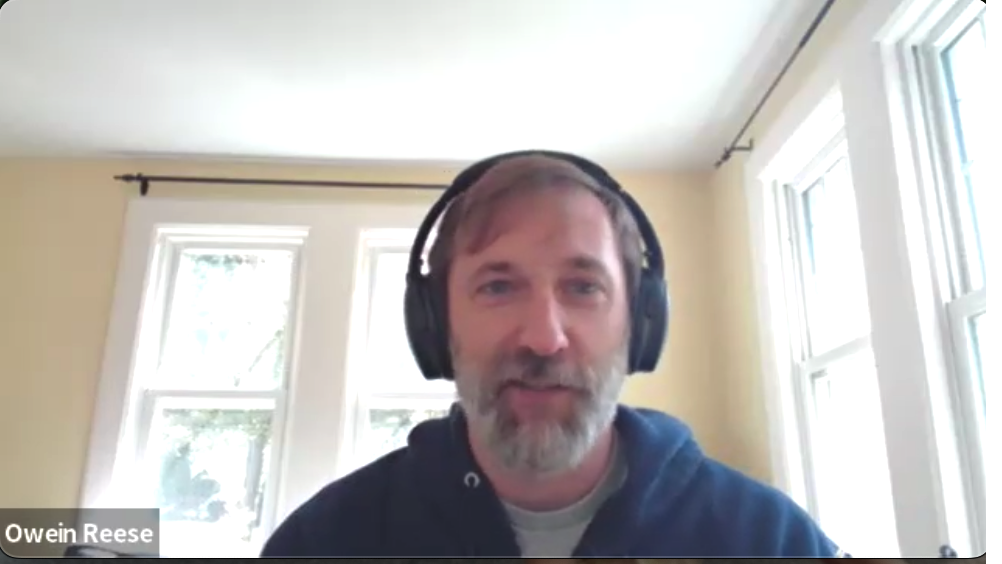
Back
Owein Reese's Career Advice for Aspiring Software Developers and Quants
Owein Reese, veteran software engineer, shares hard-won lessons with student interns at Samaritan Scout. From hedge fund burnout to startup rollercoasters, interview prep and unit testing, here's what you need to know about building a career in tech.
The Unexpected Path: How a $5 Book Changed Everything
Owein started as an electrical engineering student, but one conversation with a professor changed his trajectory. Standing over circuit boards with a soldering iron, cursing his existence, his professor said: "If you're enjoying that, just think you're gonna do this for the rest of your life."
He changed majors that day.
He pursued optics and mathematics instead, graduating into the dot-com bust where entry-level jobs required five years of experience. On his last day of school, walking past the college library with his car already packed, he spotted a used C++ book for five dollars. He bought it on impulse.
It was the best $5 he ever spent.
Your Summer Jobs in College Matter
Get the internship. Owein cannot stress this enough. Companies use internships to validate whether you're a fast learner. They're arbitraging known value (you, trained at junior pay) versus unknown senior hires.
His first job didn't train him well. He learned by doing but got no feedback, no coaching, nothing to push him further. It validated that he could be an employee, but that's about it.
Find a mentor. His second job changed everything. Someone actually wanted to mentor people. That's where he really started to grow, especially on the software side.
The Hedge Fund Years: A Cautionary Tale
After five years in Massachusetts, Owein hit Thanksgiving traffic so bad he missed the holiday entirely. He was tired of it. He moved back to New Jersey with his girlfriend (now wife) and joined the hedge fund world.
He worked 100-hour weeks and barely slept. After two and a half years, he had lost 30 pounds, gained a gut, and had high blood pressure.
His schedule: On the train at 6:30 AM. Home at 8 PM. Work until midnight. Weekends, 9 AM to 9 PM. His one vacation required him to work from 8 PM to 4 AM every night.
But here's the thing: Hedge funds and quant trading firms are the world's only true meritocracy. Corporate life isn't always a meritocracy. But the hedge fund world? It's purely rewarded for what you can do. Direct correlation.
However, burnout is real. Owein needed that experience, but he won't do it again.
From Big Company to Tiny Startup
After hedge funds, Owein joined an established Series C adtech startup with about 300 employees. Market fit, growing fast. When he left four years later, they had 1,000 employees. Revenue went from $80 million to over half a billion. He moved into management, going from one team to four.
Then he joined Arena Analytics with Dvora (Samaritan Scout's founder). He went from working with 1,000 people to 28. You could fit everyone in one room.
Startups are fun. He's in one now, a Series A type startup. Tiny companies mean the highs are high, the lows are low. It's a roller coaster.
Everyone in tech should experience a startup once. But be ready: most startups last one to two years, then they downsize significantly or disappear. Most fail. That's the standard.
Critical Career Advice: Always Keep Learning
The technology you used five years ago is not the technology you use today. You have to continually learn and grow.
Twenty years ago, UPS wanted Owein to learn COBOL. He walked away. Even then, COBOL was a dead language. He couldn't transfer that skill anywhere else.
Keep reading. Keep seeing what's happening. New languages, new frameworks, new approaches to solving problems, new infrastructure. You don't need to touch all of them, but you should experiment.
Spend time outside of work. Your first few years, everything's new. You'll learn a ton. But after two years, much of your learning will be on your own time. Play around. Explore things. Grow a couple hours a week.
Write toy projects. They let you experiment with new ecosystems, libraries, and testing approaches.
Functional Programming Changed His Code
At his second job, Owein explored functional programming: Lisp, Haskell, etc. Most jobs use Java, C#, or Python. Node on the backend. But functional programming is an incredibly different way of writing code.
It hurts a little at first to learn. But once you learn it, all your other code gets better.
He started attending meetups about it. The hedge fund that hired him used Scala, which nobody used at the time. But he knew it through these meetups. They thought: easy hire because we don't have to train him.
Learn to Test Your Code
One of the biggest things schools don't do: teach unit tests. Almost every intern Owein hired for years looked at him like a deer in headlights when he asked about unit tests. Learn this incredibly important thing early.
Samaritan Scout interns he spoke with had used JUnit. “That's wonderful. That's rare.”
The AI Revolution Is Here
AI is crucial now. Owein understands why schools have strict policies against it. You need to understand what AI is generating and validate what it produces.
But it's a crucial part of the skill set these days.
What Is Refactoring? (And Why AI Excels at It)
You write code. It works. Everything's great.
Then people want more features. You start adding more things, and more things.
Some code is developed with a clear goal in mind. Short path from start to finish.
Other code grows in an amorphous manner. It just starts growing out like a blob.
Refactoring means going in, changing it around, cleaning it up, making it better. AI is wonderful for that. Owein had to change one type of variable throughout a codebase. He told AI to do it. Five minutes later instead of two hours later, it was done. He just tested it.
Learn how to do prompts correctly in your toy projects, because once you get into the real world, you'll be using it.
Interviewing for Jobs: LeetCode is Here to Stay
Interviews test the wrong things. There are skills you use every day in software: reading code, testing code, reviewing other people's changes, triaging production issues. Only about half or less of your time (and it decreases as you grow in seniority) is actually writing code.
But companies don't invest in training people how to interview. It's much easier to test people on algorithms and data structures because there's a right and a wrong answer. So interviews default to that stuff rather than the actual work you'll do.
There's a famous joke: the guy who wrote Homebrew said Google wouldn't hire him because he didn't know how to implement a balanced binary tree. But all of Google's engineers use the code he wrote to install dependencies on their machines.
That's the unfortunate reality. You do need to know your data structures. You need to study them. You need to quiz yourself when you want to get a job. LeetCode and brain teasers are here to stay.
You can often tell the places you want to work versus the places you don't want to work by how much they rely on LeetCode versus practical problem solving.
Some of the best interviews Owein has had came from financial institutions: JP Morgan, Morgan Stanley, Citibank. The problems they give aren't necessarily LeetCode. They're reasonable problems you can reasonably do. They're really looking to see your problem solving process.
When you get into a LeetCode situation, start talking out loud. The best thing you can do is get the other person to like you during the interview.
When people like you, they're often more willing to give you a hint they wouldn't give anybody else.
The Secret Weapon: Conference Speaking
“If you can do public speaking at conferences and you're offered the opportunity to apply, do it. Absolutely.
If people like watching you present, they think you're way smarter than you are and you know way more than you do. If you ever wind up in an interview and get stuck with absolutely no idea how to progress, they will stand right in front of you and tell you the answer. Then you'll just write it down.
And they'll go: you're so smart.”
That has happened to Owein at least once. Actually, twice.
See what conferences matter to other developers you work with, especially in your internships. See if they're going to one or watching talks from one. That's how you discover the conferences that matter for the area of the job market you want to move towards.
The Bottom Line
Do the internships. Find mentors. Keep learning constantly. Be prepared for brutal hours if you pursue hedge funds or quant trading, but know it's the closest thing to a true meritocracy you'll find. Experience a startup at least once. Learn AI tools now. Practice LeetCode even though it's not the real work. Speak at conferences if you can.
And maybe, just maybe, pick up that random programming book when you see it. You never know where it might lead.
This advice comes from Owein Reese's candid conversation with software engineering interns at Samaritan Scout, a nonprofit using AI-powered search technology to connect people with volunteer opportunities.
Copyrights © 2025 Samaritan Scout, a 501(c)(3) organization. EIN: 92-3607846
